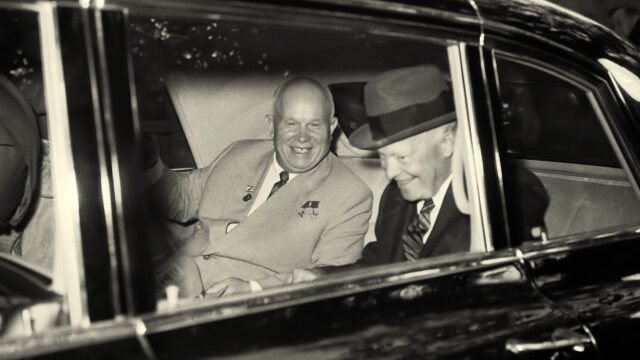
Nikita Khrushchev visits America and President Dwight D. Eisenhower in Soundtrack to a Coup d’État
SOUNDTRACK TO A COUP d’ÉTAT (Johan Grimonprez, 2024)
Film Forum
209 West Houston St.
Opens Friday, November 1
212-727-8110
filmforum.org
kinolorber.com
Two new documentaries opening November 1 in New York use music and poetry, respectively, to look at a pair of seminal moments in twentieth-century world history.
At Film Forum, visual artist Johan Grimonprez’s Soundtrack to a Coup d’État is a 150-minute jazz epic, an exhilarating barrage of words, images, and music that delves deep into the January 1961 assassination of Patrice Lumumba, the first prime minister of what would become the Democratic Republic of the Congo. In 1960, in a move that struck a blow against colonialism, sixteen African countries were admitted to the United Nations, and that year also saw the UN’s first peacekeeping operation on the continent. Amid espionage and international machinations, the cold war reaches new levels. Soviet chairman Nikita Khrushchev rhythmically bangs his shoe on a General Assembly table and US president Dwight D. Eisenhower befriends Belgian king Baudouin in an effort to secure uranium. The CIA gets involved in possibly nefarious operations in Africa, using unknowing jazz musicians as deflections.
Grimonprez (dial H-I-S-T-O-R-Y, Shadow World) and editor Rik Chaubet interweave quotes by Khrushchev, Eisenhower, Malcolm X, Sukarno, Gamal Abdel Nasser, Fidel Castro, activist Léonie Abo, Irish diplomat and writer Conor Cruise O’Brien, CIA director Allen Dulles, Secretary of State John F. Dulles, activist Andrée Blouin, mercenaries “Mad” Mike Hoare and Bruce Bartlett, Belgian premier Gaston Eyskens, UN secretary-general Dag Hammarskjöld, writer In Koli Jean Bofane, CIA station chief Larry Devlin, DRC president Joseph Kasa-Vubu, Voice of America broadcaster Willis Conover, Belgian colonel Frédéric Vandewalle, and others with songs by such legends as Nina Simone (“Wild Is the Wind”), Louis Armstrong (“Black and Blue”), Miriam Makeba (“Mbube”), Thelonius Monk, John Coltrane (“In a Sentimental Mood”), Miles Davis (“Blue in Green”), Ornette Coleman (“January”), Dizzy Gillespie (“And Then She Stopped”), and Duke Ellington (“Take the ‘A’ Train”), along with archival footage, album covers, and boldly designed graphics.
The musical centerpieces are drummer Max Roach and vocalist Abbey Lincoln (“Tears for Johannesburg,” “Freedom Day,” “Triptych: Prayer/Protest/Peace”), who, at the UN Security Council in 1961, protested the murder of Lumumba, and Gillespie, who speaks with his trademark humor about the controversies. “This is what you might call a cool war,” Ellington tells Gillespie, who responds, “The weapon that we will use is the cool one,” holding up his horn. He also has fun teasing a television news journalist about the situation in Africa.
Powerful, poetic quotes are spoken or are blasted across the screen.
“One day independence will come to the Congo and the white will become black, and the black will become white.” — Congolese cleric Simon Kimbangu
“There is a limit to the usefulness of the past.” — Indian UN ambassador Krishna Menon
“The enemy is imperialism.” — Ghanaian president Kwame Nkrumah
“Any fool can start a war that even a wise man cannot end.” — Soviet chairman Nikita Khrushchev (over footage of a submarine rising through ice and Khrushchev petting his dog, looking like a Bond villain)
“Sure, I’d rather be a poet than a politician. . . . I’m suspicious of the written word; I prefer the spoken word. I trust it more in the world of politics.” — Belgian premier Paul-Henri Spaak
“If Africa is shaped like a revolver, then Congo is its trigger.” — French psychiatrist and philosopher Frantz Fanon
Soundtrack to a Coup d’État is like a multimedia jazz concert, every minute promising some kind of improvisatory surprise from many of the greatest singers and instrumentalists of the era. It’s a radical documentary with radical views; the scenes when Khrushchev and Castro come to America are unforgettable, and several of its positions on issues are controversial. But it moves and grooves to the rhythm of the beat in a way that will suck you into its world while making you reconsider much of what you know about the incidents it explores.
Grimonprez will be at Film Forum for Q&As following the 6:45 screening on November 1 and the 4:00 show on November 2.
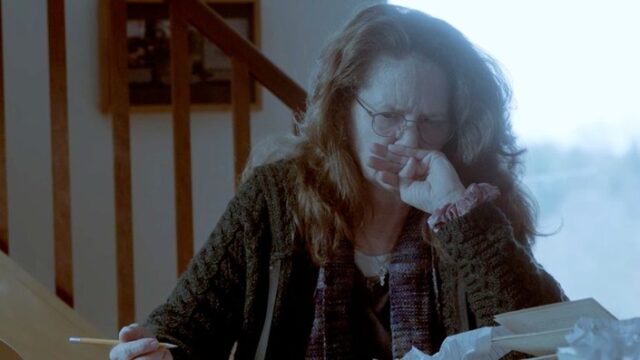
After: Poetry Destroys Silence explores how poetry deals with such tragic events as the Holocaust
AFTER: POETRY DESTROYS SILENCE (Richard Kroehling, 2024)
Cinema Village
22 East 12th St. between University Pl. & Fifth Ave.
Opens Friday, November 1
www.cinemavillage.com
www.after.film
In the 2016 documentary The Last Laugh, director Ferne Pearlstein spoke with survivors as well as such comics as Mel Brooks, Carl Reiner, Harry Shearer, David Steinberg, Susie Essman, and Rob Reiner in an attempt to find a connection between humor and the Holocaust “You can do jokes about Nazis,” Gilbert Gottfried says in the film, “but if you say ‘Holocaust,’ then it becomes bad taste.”
In After: Poetry Destroys Silence, writer, director, and editor Richard Kroehling looks at the relationship between poetry and the Holocaust, but, unsurprisingly, there is little humor to be found. It’s an intensely serious film that tries to tell its story in a form that mimics that of its subject. Just as Soundtrack to a Coup d’État unfurls like a jazz concert, After is told like an epic poem. But in this case, scenes of poignant purity and beauty are interrupted by self-congratulatory moments as experts feel the need not just to share poetry but to defend its existence as a necessary art form in interpreting history.
Following a projected quote from Theodor Adorno that reads, “To write a poem after Auschwitz is barbaric,” poet Alicia Ostriker explains, “After Auschwitz, poetry is barbaric. It’s easy for people to think that and many people do, but they’re thinking that is part of the contempt for poetry; that is also contempt for the human soul.”
“After certain kinds of genocide and suffering, how can the world go on at all?” poet and critic Edward Hirsch asks. “I think it’s the obligation of poetry to respond to certain kinds of horror. The Holocaust is a kind of test case for poetry because of course it defies language. It defeats language. And yet language has to respond. It’s our job as poets to remember what happened.”
The film works better when it concentrates on the poems themselves, which are often accompanied by archival footage from Auschwitz, shots of nature (especially fire and water), whispers, and music from a violin, piano, and typewriter. Citing memories from his time in the camps, ninety-one-year-old survivor Walter Fiden proclaims, “Everything can be overcome. Nothing is hopeless.”
Hungarian poet and actor Géza Röhrig (Son of Saul, To Dust) recalls visiting an empty Auschwitz in 1986, using a map his grandfather made, and seeing various artifacts left behind, from toothbrushes and children’s toys to Hebrew letters and drawings on walls. He notes, “I felt that if I could not become six million, I will step into the shoes of one.”
There are other contributions from survivor Paul Celan, Yehuda Amichai, Christine Poreba, Taylor Mali, Sabrina Orah Mark, film producer Janet R. Kirchheimer, and Pulitzer Prize nominee Cornelius Eady, who performs an anonymous poem from the Warsaw Ghetto with a jazz sensibility. In a ten-minute segment in the middle of the film, Oscar winner Melissa Leo (The Fighter, Frozen River) and Bo Corre (Mulberry St., Harrow Island) try to find meaning in a lost photograph from 1945. Tribute is paid to Raoul Wallenberg, Oskar Schindler, and André Trocmé. The late photographer Charles Carter recites haunting poetry while contemporary shots of his are mixed in with historical footage. The beautiful cinematography is by Lisa Rinzler, with evocative sound by Helge Bernhardt.
In Soundtrack to a Coup d’État, Max Roach declares, “We do use the music as a weapon against man’s inhumanity toward man.” The same can be said for the poetry in After.
After: Poetry Destroys Silence opens November 1 at Cinema Village, with Kroehling on hand for a Q&A following the 1:00 screening. On November 3 at 5:00, Kroehling, Kirchheimer, Eady, and Röhrig will participate in a panel discussion and reception at Town & Village Synagogue, moderated by Rabbi Irwin Kula, and there will be a panel discussion with the same group on November 6 at Cinema Village after the 7:00 show.
[Mark Rifkin is a Brooklyn-born, Manhattan-based writer and editor; you can follow him on Substack here.]
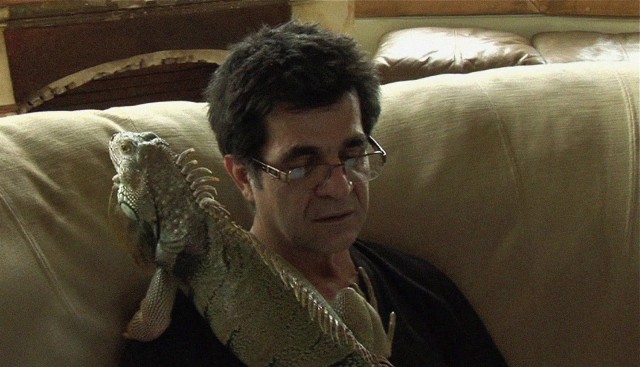
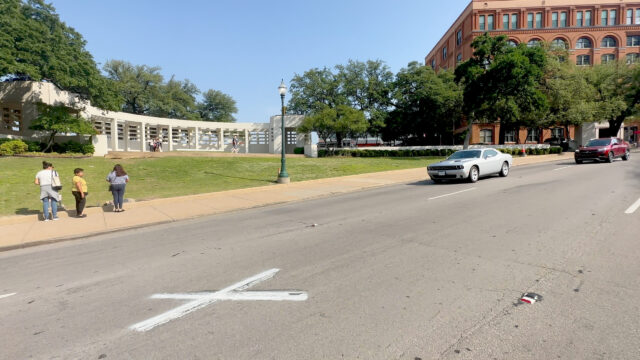
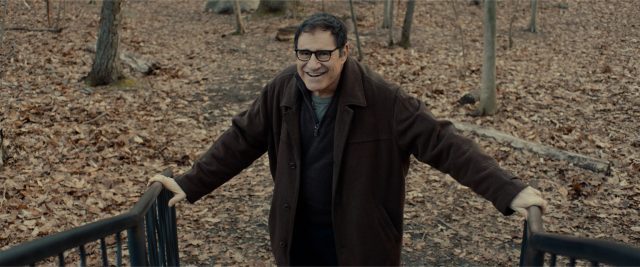
 Character actor supreme Richard Kind has excelled at playing more than a few schlemiels during his four decades in showbiz, which has included more than 230 film and television roles in addition to plenty of live theater, from LA and Chicago to Broadway (The Producers, The Big Knife). The sixty-two-year-old Trenton native, who has had recurring parts in Mad about You, Gotham, Spin City, and Red Oaks and played key roles in such films as A Serious Man in addition to voices in the Cars and Toy Story franchises, takes center stage in the bittersweet indie film Auggie, which opened this weekend at Cinema Village.
Character actor supreme Richard Kind has excelled at playing more than a few schlemiels during his four decades in showbiz, which has included more than 230 film and television roles in addition to plenty of live theater, from LA and Chicago to Broadway (The Producers, The Big Knife). The sixty-two-year-old Trenton native, who has had recurring parts in Mad about You, Gotham, Spin City, and Red Oaks and played key roles in such films as A Serious Man in addition to voices in the Cars and Toy Story franchises, takes center stage in the bittersweet indie film Auggie, which opened this weekend at Cinema Village.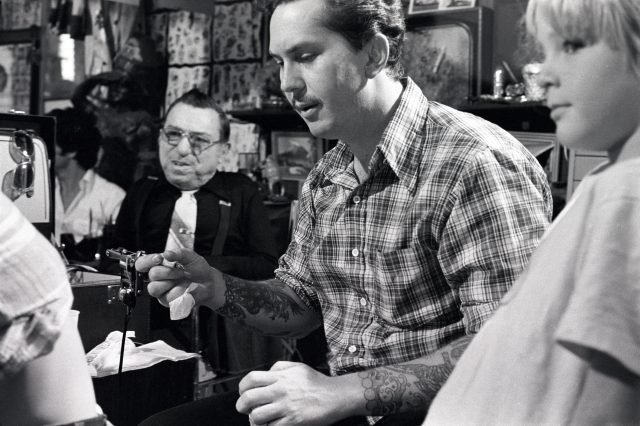
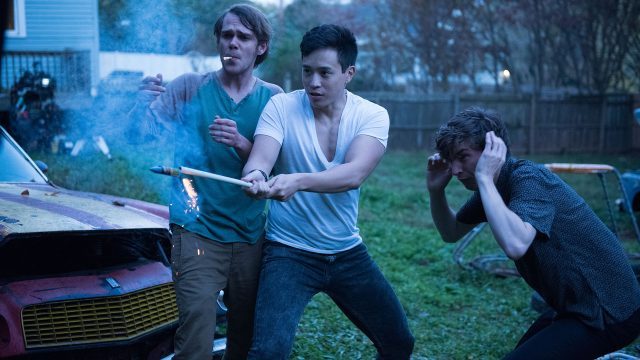
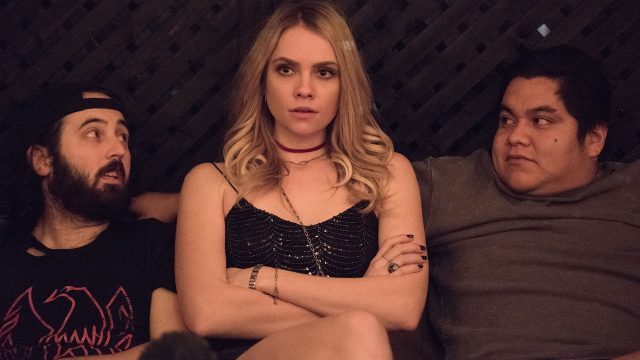
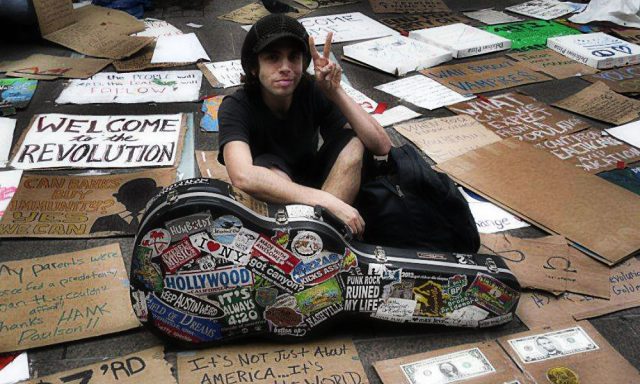
 Filmmaker Karen Kramer spent seven years on Renegade Dreamers, including four years following a group of young contemporary spoken word artists and protest singers. She could have done something better with her time. A longtime downtown New Yorker who made The Ballad of Greenwich Village in 2005, Kramer initially set out to make a documentary about the coffeehouse scene around MacDougal and Bleecker Streets in the 1950s and ’60s, and the sections of Renegade Dreamers about the post–World War II Beat poets and folk singers, including Allen Ginsberg, Bob Dylan, Jack Kerouac, Gregory Corso, Pete Seeger, Joan Baez, Len Chandler, and others, as well as Woody Guthrie, are terrific, with rarely seen archival footage that is stirring and exciting. She speaks with such key figures as Wavy Gravy, Hettie Jones, Eric Andersen, Ronnie Gilbert of the Weavers, Maria Muldaur, David Amram, Izzy Young, Tom Paxton, and Richie Havens (some interview footage was completed for her previous film), who share intimate stories about their struggle against McCarthyism, the Vietnam War, anti-unionism, consumerism, and conformity. “They considered progressive thinking to be anti-American,” Peter Yarrow says of 1960s mainstream America, something that is true again today.
Filmmaker Karen Kramer spent seven years on Renegade Dreamers, including four years following a group of young contemporary spoken word artists and protest singers. She could have done something better with her time. A longtime downtown New Yorker who made The Ballad of Greenwich Village in 2005, Kramer initially set out to make a documentary about the coffeehouse scene around MacDougal and Bleecker Streets in the 1950s and ’60s, and the sections of Renegade Dreamers about the post–World War II Beat poets and folk singers, including Allen Ginsberg, Bob Dylan, Jack Kerouac, Gregory Corso, Pete Seeger, Joan Baez, Len Chandler, and others, as well as Woody Guthrie, are terrific, with rarely seen archival footage that is stirring and exciting. She speaks with such key figures as Wavy Gravy, Hettie Jones, Eric Andersen, Ronnie Gilbert of the Weavers, Maria Muldaur, David Amram, Izzy Young, Tom Paxton, and Richie Havens (some interview footage was completed for her previous film), who share intimate stories about their struggle against McCarthyism, the Vietnam War, anti-unionism, consumerism, and conformity. “They considered progressive thinking to be anti-American,” Peter Yarrow says of 1960s mainstream America, something that is true again today.